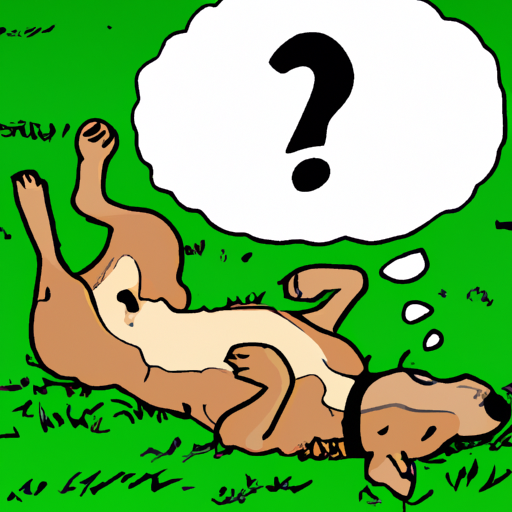As dog owners, we’re often left scratching our heads at the peculiar habits of our four-legged friends. One such behavior that has puzzled many is why dogs roll on their backs. Is it a sign of submission or a method of communication? Or could it be a clever trick to get your attention? Let’s dive in and explore the possible reasons behind this curious canine behavior.
Table of Contents
- Communication and Social Behavior
- Scent Disguising
- Itchy Backs and Skin Issues
- Play Behavior
- Comfort and Relaxation
Key Takeaways
- Dogs roll on their backs for various reasons, including communication, scent disguising, skin issues, play, and relaxation.
- Understanding your dog’s behavior can help improve your bond and ensure they’re comfortable and happy.
Communication and Social Behavior
In the complex world of canine communication, body language plays a significant role. Rolling on their back can be a dog’s way of showing submission or deference to another dog, especially a more dominant one. This behavior is believed to originate from their wolf ancestors, where the less dominant members of the pack would expose their belly to show submission and avoid conflict. If your dog rolls over during a play session, it’s their way of telling you they’re having fun and they trust you. Here’s more on canine communication and social behavior.
But remember, not all back-rolling is a sign of submission. Your dog might simply be comfortable and relaxed in your presence, similar to how we might lounge on a comfy sofa after a long day. Here’s a good read on understanding canine body language.
Scent Disguising
You might have noticed that your dog loves rolling in grass or piles of leaves, especially those with a strong odor. This behavior is believed to be a throwback to their wild ancestors who would roll in the scent of decomposing animals or feces to disguise their own scent while hunting. While this behavior might seem gross to us, to your dog it’s perfectly natural. Here’s an insightful article about dogs and their strong sense of smell.
Itchy Backs and Skin Issues
If your dog seems to be rolling on their back excessively, it might be due to an itchy back or skin issues. Common culprits include allergies, parasites, or skin infections. It’s always a good idea to consult with a vet if you notice your dog showing signs of discomfort or distress. Here’s a helpful guide on common dog skin problems and solutions.
Play Behavior
Playtime is an essential part of a dog’s life. Rolling on their back during play is a common behavior and is often a sign your dog is having fun and engaging in the play session. It’s a way for them to show they’re not a threat and are ready to have a good time. If you see your dog rolling on their back during play, it’s a good sign they’re feeling safe and comfortable.
Comfort and Relaxation
Sometimes, dogs simply roll on their back because it feels good. The cool grass on a hot day, a soft carpet, or a cozy bed can all entice a dog to roll on their back and wiggle around. It’s their way of enjoying simple pleasures and getting comfortable.
Frequently Asked Questions
Why does my dog roll on his back in the grass?
This could be due to several reasons, including trying to disguise their scent, scratching an itch, or simply enjoying the feeling of grass against their back.
Is it bad if my dog rolls on his back a lot?
If your dog seems to be rolling on their back excessively and showing signs of discomfort or distress, it might be due to skin issues or allergies. It’s always a good idea to consult with a vet in such cases.
Should I stop my dog from rolling on his back?
As long as your dog is not in discomfort or distress, and the surface they’re rolling on is safe, there’s no harm in letting them enjoy this behavior. It’s a natural part of being a dog!
In conclusion, there are myriad reasons why dogs roll on their back, ranging from communication to simple enjoyment. By understanding these behaviors, we can better connect with our canine companions and ensure their happiness and well-being.



